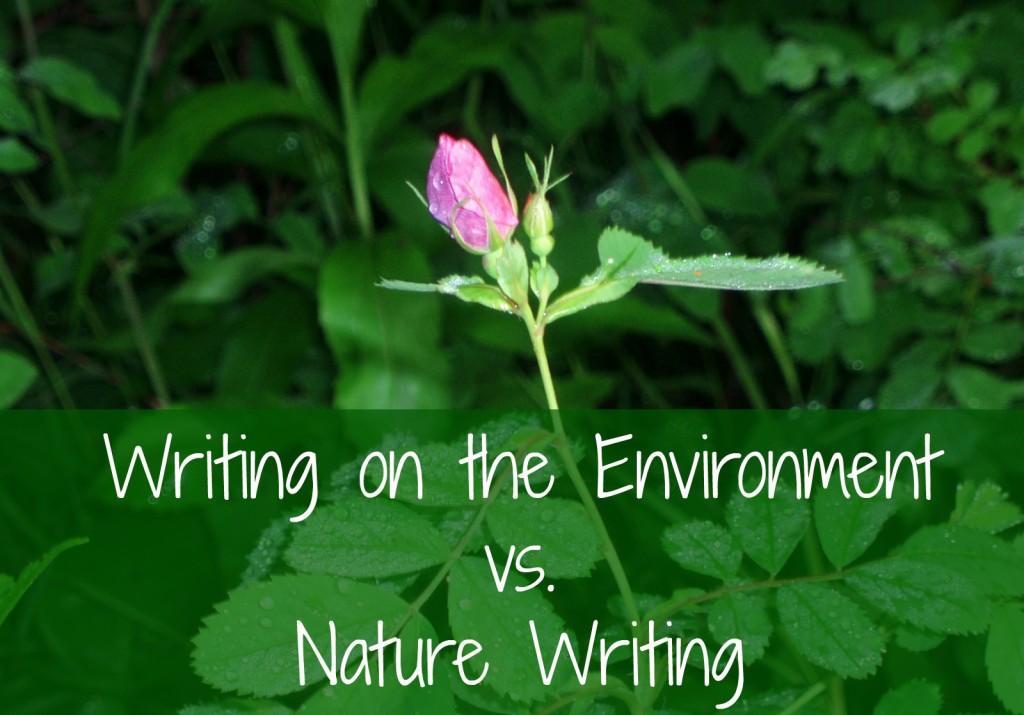One of my classes this year is entitled Studies in the Rhetorics of Non Fiction. Specifically, the focus is Writing on the Environment.
Writing on the Environment, or Nature Writing, as it is also called, often brings to mind two styles of writing: first, the intensity of, for example, a Greenpeace report; and second, the flowery passages written by great writers of literature from hundreds of years ago. Both of these styles can be turn-offs to many people. The first style might appear too brusque, embarrassing, or guilt-inducing, causing the reader to roll their eyes in exasperation at the prophetic notion that the world is coming to an end. The second style can appear too inconsequential and boring for readers to be able to pay attention to for very long.*
At the risk of students believing that this course was all about writing poetry, my professor prefers the term Writing on the Environment as opposed to Nature Writing. I am inclined to agree. The way in which we term things has a profound influence on our thoughts about it. The phrase Nature Writing also doesn’t seem to encompass all of the different styles and genres that can be identified as subtypes of the phrase Writing on the Environment.
For the purposes of simplicity sake, however, we are referring in class to this style of writing as Nature Writing—it is easier to say. Much of what we do is out of convenience and ease. This leads to an important question within the study of rhetoric; namely, does our choice to use the simpler terms then affect how we view the subject that we are using the term for?
That alone is a question which, when we really think about it, can empower us: depending on the terms that we choose to use, we can manipulate how such a thing will be seen by the world, and therefore we can direct certain perspectives on the world just by being careful in our word choice.
The different between Writing on the Environment and Nature Writing
Nature Writing brings to mind the peacefulness of strolling along a walking trail in a forest, drinking in the sights and sounds and smells of greenery and birds. It is a poetically calming style. Writing on the Environment represents a more serious, professional attitude. The use of “environment” rather than “nature” also implies responsibility and action, because the word is often associated to human activity. “Nature,” on the other hand, is usually viewed as something separate to human society. The End of Nature by Bill McKibben is a compelling account of this issue, among others.
There are many sub-genres of this style of writing, so to pinpoint exact characteristics of it is no easy task. Writing on the Environment can fluctuate from natural history information to field guides to adventure writing to the ramble to man’s interaction with nature. Factual and abstract, imperial and argumentative, impersonal and having a voice, nature itself and the writer him/herself all have the potential to be present within this style.
Part of this is because of the nature writer’s dilemma: we do not know nature itself and we do not know how to define it. The terms that we use to describe nature become the only way we see, rather than a lens through which to see the world. Words, therefore, are just as much an imposition as they are a convenience (for more on this subject, refer to John Hay’s article, “The Nature Writer’s Dilemma”). As ever, the terms that we use will change how we view the world. It is this which nature writers can take advantage of to get their point across: when we know our audience and know our own material, we will be a better judge of conveying information.
*Please note that I don’t necessarily agree with either of those responses toward specific types of Nature Writing; that is simply how, I think, many people do often react to such genres.

I’d love to borrow your books after
I think the most important form of “writing on the environment” is writing that motivates everyday citizens to something to protect nature or control pollution. The risk of spending too much time categorizing that is that you will end up preaching to the choir
[…] writing, or writing on the environment, can take any number of different turns: it may involve a poetical voice, a rant, a description of […]